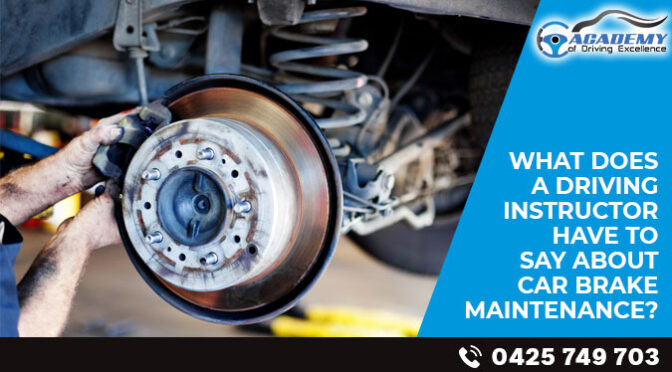Maintaining the braking system of your car is probably the topmost priority in the list of ‘to-do’ things to maintain a car. The reason is pretty obvious – while on one hand, it will help you keep your maintenance cost under control, on the other hand, most importantly, it will ensure the safety and security of the occupants of cars as well as the pedestrians and other vehicles plying nearby.
That’s why, quite obviously, every driving instructor in Melbourne, like anywhere else, will come up with specific instructions about the maintenance of the brakes.
On this page, we shall discuss the thumb rules that the driving mentors of reputed schools would insist the learners maintain in regard to the maintenance of car brakes.
Taking a Hard Look at the Brake Pad and the Rotors
The rotors and the brake pads are the contact points between the braking system and the tyres. Both of them tend to deteriorate more than the other components and, thus, would need more frequent maintenance. Friction between the brake pads and the tyres results in the generation of heat, and this heat will cause wear and tear on the brake pad. Thus, it is extremely important to conduct periodic inspections of the structural integration and the depth of the brake pads to ensure that they have adequate resistance left to make the braking system work to its fullest potential. In case you notice even the earliest signs of depreciation or any burning smell, or if you find that the car is taking an increasingly longer distance to come to a complete halt upon application of the brake pedal, experienced Melbourne driving instructors would suggest taking the car immediately to a repair centre.
Flushing the Brake Fluid Periodically
As and when press the brake pedal, that generates pressure, which is in turn transmitted through the brake fluid into the callipers from the master cylinder via the brake lines. Subsequently, the callipers transmit this pressure to the rotors and the brake pads.
The brake fluid hence acts as the transmitter or the medium of transmission of the pressure and hence, plays an extremely pivotal role of messenger in this entire braking mechanism.
This fluid, unfortunately, attracts a lot of moisture, and when that happens, it proves to be disastrous for the entire braking system. Moisture results in corrosion of the different metallic components that form the part of the braking system, which decreases the boiling point of brake fluid, thereby arresting the effectiveness of the brakes. That is why driving mentors of every reputed driving school in Melbourne would suggest flushing off after driving a considerable distance. More so, in case you notice a cloudy or milky appearance of the fluid, you must flush it off immediately.
Bleed the Brake Lines
Apart from flushing off the brake fluid, it is also important to bleed the brake line to remove excess air. When small amounts of air bubbles start accumulating in the brake line by getting trapped, they can collate to form a considerable amount of air, which will significantly reduce the efficiency of the braking system.
Other than all these steps, the mentors of every Melbourne driving school will suggest replacing the spare of the braking system periodically to keep the system in top condition.
Our instructors at the Academy Of Driving Excellence would do the same. Call us to know more about us and our lessons. Or get on with the training straightaway after choosing a training package of your choice.










